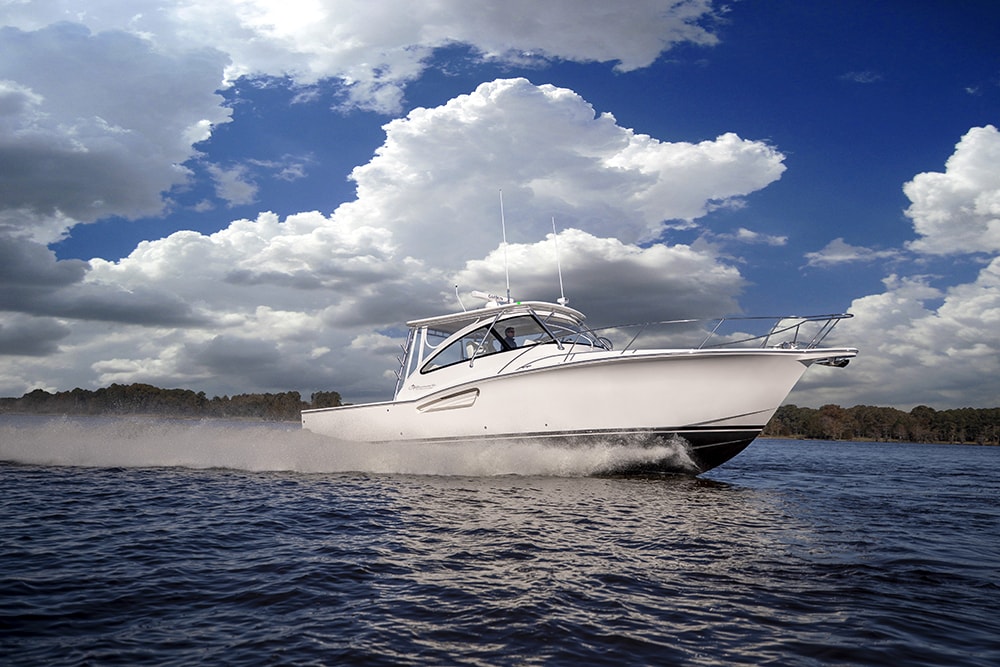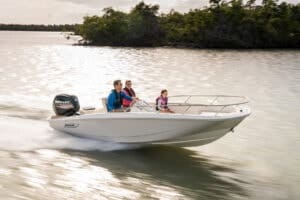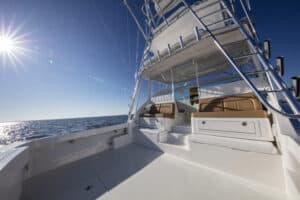You’ve heard your friends and family members talk fondly about seeing dolphins splashing around right near the boat, taking their kids tubing, and enjoying cocktails on deck while enjoying the sunset. They come home sun kissed and happy, each time they take their boats out. So, you know you want to be a part of this prestigious boat owner’s club. In fact, you want to get on the water as soon as possible and start making your own boating memories. But before you become a boat buyer, you need to know how to buy a boat, which boat is right for you, and how you’re going to pay for the boat.
Let’s dive right in! If you need help achieving your goal of buying a boat, learn how we do boat loans at Trident Funding. We help you smoothly sail through the entire boat buying process. Whether you’re buying a new or a used boat, we will match you with the best boat lender and help you get a boat loan. Check out our website to apply for a boat loan online and in the meantime, use our free boat loan calculator to see how much boat you can afford.
Boat Buyer’s Guide: How to Buy a Boat
First, consider these 12 questions to ask when buying a boat. Next, you need to decide which type of vessel you’re going to purchase. When deciding what type of boat to buy, there are some important things to keep in mind. Consider your budget, not just your budget to purchase the boat, but you also need to consider the costs of owning a boat which include cleaning it, maintaining it, future repairs, storage, docking fees, and boat insurance.
In addition to your budget, consider why you want a boat? Do you want to use it every weekend as a way to release stress, will you be using it to travel with your family and friends, will you be using it as a business such as a charter boat, or do you just want to take your dog fishing at the lake every Sunday?
Think about how many people you plan to have onboard, if you will need cabins and heads onboard, if you will be hosting guests overnight, if you will need a kitchen, crew quarters, fishing gear storage, or room to stow your water toys. Also consider where you’re going to take the boat: what bodies of water, freshwater or saltwater, and how often you plan on using the boat.
The way you plan on using the boat is one of the most important factors in what boat you should buy. For example, if you want to slowly cruise around the lake with a group of friends, a pontoon boat may be ideal, with its open seating plan. However, if you plan on doing some serious water skiing, then the pontoon boat may not have enough horsepower to tow you, and a jet boat or a deck boat may be more suitable. Same goes for if you want to island hop around the Bahamas, a cabin cruiser or a yacht are ideal, but a speed boat won’t give you enough space to comfortably relax onboard. You get the drift.
After you decide how you’re going to use your boat and you find the make and model of a boat that matches your lifestyle, then you need to contemplate whether you’re going to buy the boat new or used. There are pros and cons to buying both new and used boats. For example, you will be the very first one to drive your new boat which is special, but you may get a better deal on a used boat.
Where to Find New Boats
You can typically find new boats at the following places:
- Directly from the manufacturer: such as Yamaha, Azimut, or Sea Ray. This may be online or you may be able to visit their showroom.
- Boat dealership: Work with a boat dealer to purchase a new boat. They often have access to multiple makes and models of different boats, and you may be able to go to their location to check them out. They often service boats as well and you can work with one person throughout the entire transaction.
- Boat show or event: See a boat you love at a boat show or boat convention and you may be able to schedule a sea trial and purchase it directly from the representative you met at the boat show.
Where to Buy Used Boats
Look for used boats at the following places:
- Boat dealership: Sometimes boat dealers sell both new and used boats at their location. They often put boats from the previous model year on sale when they’re getting ready for new models to arrive. This is a convenient option because you can often see the boat in person and can get it serviced at the same place you purchased it.
- Online: So many websites sell used boats online including Boat Trader, YachtWorld, boats.com, and more. It’s always recommended to see the boat in person before purchasing it, especially if you’re buying a used boat from a private seller. Beware of scams and prices that seem too good to be true.
- Marina: Some marinas sell the boats that they rent out and they often allow their customers to put for sale signs on their boats as well. You may want to check out a local marina to see if they have any boats for sale. If you find something you like, you’re right by the water, so scheduling a sea trial is easy.
What to Look for Before Buying a Used Boat?
Buying a used boat can save you money upfront. You will typically pay less for a used boat than a new boat and you won’t take as much of a hit on boat depreciation. You won’t have to be the one to ‘break in’ the boat and you will already know what quirks and issues the boat has.
However, not everyone is an honest seller, so there are some things you will want to look for before purchasing a used boat such as:
- How many hours are on the boat engines
- Service and maintenance records
- Find out where and how the boat was stored: dry or wet storage etc.
- Has the boat ever been in an accident, damaged from a storm, or run aground
- Condition of the boat including the interior and exterior; look for rips in the upholstery, damage to the floors, dings on the hull, etc.
- Inspect all systems including plumbing, mechanical, and electrical. If you’re not knowledgeable in this area, bring along a mechanic or schedule a formal boat inspection.
- Make sure that the person selling the boat is actually the seller. Ask to see their identification and registration information.
The Boat Purchase Process
When purchasing a boat, the process typically goes as follows:
- Decide on your budget. Despite how fun it may be to shop for boats before setting a budget, this is never a good idea. If you fall in love with a $1.5 million yacht, you will be so disappointed when you realize you can only afford a $750,000 cabin cruiser. You will constantly be comparing all future boats you look at to the ‘dream’ boat, so to avoid all of this, set your budget first. Check out an online boat loan calculator to see how much boat you can afford and get a boat loan with Trident Funding. Once you know how much boat you can afford, then start shopping!
- Research and choose the type of boat you want to buy. This is where you evaluate your lifestyle, consider how you’re going to use the boat, and how many people you want the boat to be able to comfortably accommodate. Keep in mind things like where you will take the boat, the types of water the boat will be in, and how often you will use the boat. Are speed and horsepower important to you? Do you need storage space? Do you like lots of comfortable lounge chairs and cup holders or would you prefer rod holders and fish tables?
- New or used? Decide if you’re going to buy a new or used boat. Your budget and the type of boat you want may affect this decision. If you have your heart set on a yacht, but your budget doesn’t allow a new one, consider a used option. You may be able to find all of the same options on a used boat and you will save some money in the process.
- Finish the loan application process. Work with Trident Funding to finish your application and get funded. Our marine financing company will help you through the entire boat purchasing process. We will schedule inspections, organize closing on your boat, and provide any necessary boat registration and title paperwork.
- Buy boat insurance. Boat insurance should be purchased every time you purchase a boat. It is generally required if you finance the boat. You can find out if your homeowners insurance company offers boat insurance or you can shop around online for companies that specialize in marine insurance.
- Decide where you’re going to keep your vessel. Do you have room in your garage? Do you own a slip on the water? Will you be storing your boat at a marina? Consider wet storage and dry storage options. Check out prices, availability, and amenities offered. Consider how easy it will be to access your boat at the storage facility.
- Buy your boat! Go to closing, fill out all of the boat loan documents and boat registration documents. You’re officially a boat owner! Enjoy your new boat, get out on the water, and make memories that will last a lifetime.
Pro Tips on Buying a Boat
Here are some tips from the pros on buying a boat; whether it’s your first boat, or you’re a seasoned boater, these may be some helpful things you didn’t know.
- Ask for a sea trial: This is like test driving a car. You get to see how the boat handles on the water. It may be less comfortable than you imagined, slower, or a choppier ride. It’s so important to get a feel for the boat before you buy it. Now this isn’t always possible if you’re purchasing a boat and there isn’t water nearby, but at least try to take a similar boat on a sea trial. You wouldn’t buy the car before driving it; so don’t buy the boat before driving it either.
- Check the oil: This may seem obvious, but so many people forget to do this and end up with engine problems that may have prevented them from buying the boat. Pull the dipstick and check the oil. Make sure oil is there and that it’s not milky. If it’s milky, that means water is in the oil.
- Don’t be afraid to ask questions and bring an expert: Ask those ‘silly’ questions. If it’s a used boat, find out why it’s being sold, where it was stored, what waterways it was used on, and how often it was driven. If you don’t know a lot about boats, bring a friend that does, or pay a mechanic to inspect the boat and even go on a sea trial with you. Those questions may save you thousands in the long run. The more you know about the boat the better.
- Like the boat you buy: Buying a boat is a major purchase and you don’t want to make a rash decision. Don’t get caught up on the first boat you see or sold on some gadgets that a seller added to the boat. Do your research and wait to buy a boat until you find the one that is right for you. You want to enjoy it for years to come. You will probably spend a lot of time on it, a lot of money, and you don’t want to regret buying a boat that doesn’t have enough seating, or that can’t hold your fishing rods.
Once you find a boat you like, take it out on a sea trial, and have a mechanic look at it, then it’s time to figure out how to pay for it. That’s where Trident Funding comes in. We can guide you through the entire boat buying process from filling out the application to scheduling inspections to registering the boat and everything in between. Apply online and enjoy smooth sailing while Trident matches you with a qualified marine loan to meet your needs.
The Wrap Up: Buying a Boat
Buying a boat doesn’t have to be a daunting process. In fact, it can be fun and exciting as long as you keep a few things in mind such as your budget, how you’re going to use the boat, and where you’re going to store the boat. Remember to choose a boat that works for your lifestyle.
Decide if you want to purchase a new or a used boat and do your due diligence with checking out the boat, scheduling an inspection, negotiating the price, and researching the company you buy it from. This boat buyers guide should help answer your questions on how to buy a boat.
Frequently Asked Questions: Boat Buyer’s Guide
What Boat Should I Buy?
The boat you should buy isn’t a one size fits all answer. Instead, it will depend on a number of factors including:
- How you’re going to use the boat: For fishing, recreation, water sports, or relaxation? Think about how you envision yourself using your new boat and then see which boat lines up with that vision. For example, if you want to island hop and go on overnight trips, you will want a cabin cruiser or a yacht. If you want to go deep sea fishing, you will want a fishing boat with a V-shaped hull that can easily chop through the waves.
- Where you’re going to use the boat: Freshwater or saltwater, in canals, lakes, or the ocean. Will you go on day trips or overnight trips?
- How many people will be on board: Do you plan on bringing lots of friends, your large family, or is the boat just for you and your spouse?
- Your budget: How much can you afford to spend on a boat? Check out a boat loan calculator to get a better idea of how much boat you can afford.
- How often you will use the boat: You may spend more on a boat if you live somewhere like Florida or Southern California where you can generally use your boat year round.
- Where will you store the boat: If you live on a lake and have a small boat slip, you’re not going to want to buy a yacht. Consider storage options and costs in your area before buying a boat.
What Boat is Best for Beginners?
The best boats for beginners are affordable, easy to maneuver, have lots of features, and are in good condition. Beginner boats don’t need immediate repairs and they are ready to take out on the water as soon as you buy them.
Some boats to consider purchasing for beginners include:
- A jet boat
- A deck boat
- A bowrider
- A center console boat
- A pontoon boat
- A cabin cruiser
Boats that aren’t ideal for beginners include:
- Yachts: unless you have a captain
- Speed boats
- A sailboat: Unless you have experience sailing
You don’t want your first boat to be huge, cumbersome, too fast, or overly expensive because you’re still learning how to drive it, and will inevitably scratch it up a bit. Your first boat should be versatile enough so that you can take it in different bodies of water, use it for fishing, comfortably entertain friends and family onboard, and partake in some basic water sports like inner tubing.
You want to try it all and see what you like. Figure out what you enjoy doing most on the water, your boating style, and your favorite places to go. And then your next boat can represent you a bit more.
If you need help financing your first boat or even your tenth boat, learn how we do boat loans at Trident Funding. We treat each client like family, and are well-versed in marine financing, and the boating industry in general.
What Boat is the Cheapest to Purchase?
Assuming that you want a boat with a motor and not just a dinghy or a canoe, then you should expect to spend around $25,000 or more for a quality used boat. You may be able to find a pre-owned, small aluminum fishing vessel, an all purpose fishing boat, a basic deck boat, a pontoon boat, a bass boat, or even a smaller bowrider. Check out the different makes and models and consider how you’re going to use the boat and how many people it will comfortably hold.
It’s important to, of course, consider your budget, but you also want to make sure the boat is in good condition so you don’t have to spend additional money on repairs. Besides the cost of purchasing the boat, you will need to factor in additional expenses including boat insurance, storage and docking fees, maintenance, cleaning, and boat accessories.
If you want to keep that money in your pocket and finance a boat, contact Trident Funding for boat loan information. We finance boats from $25,000 to over $2 million and you can easily apply online and get approved within a couple days. The faster you apply, the faster you will be out on the water enjoying the sea spray in your face, the sun beaming down on you, and the satisfaction that you made it…you accomplished your goal of owning your very own boat!





